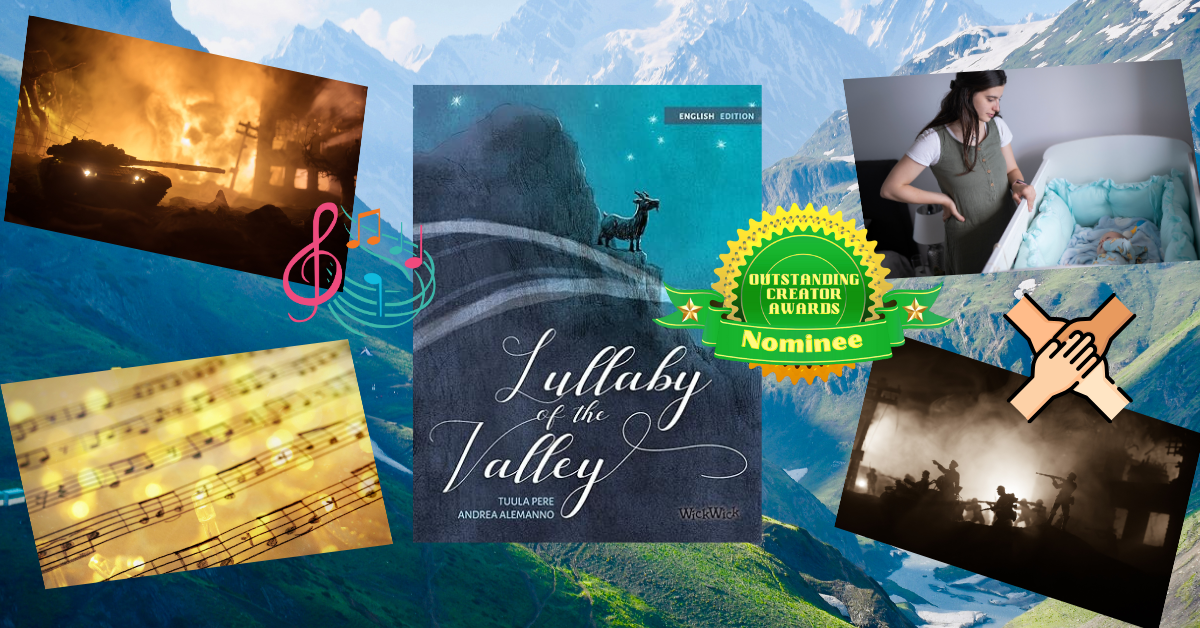|
Score: 91/100 (9.1 out of 10)
Something we've always admired about Tuula Pere and her books is how they're willing to get deeper and darker. While this is far from the darkest of Pere's books, it does explore the topic of war, which mostly occurs in the background. This isn't a violent book, but it is a book about the consequences of conflict and its impact on the civilian populations, mainly that they live in fear and apart from their loved ones (who are deployed). Lullaby of the Valley concerns a war that sparks between two neighboring towns in the same valley. They have a history of friendship and partnership that goes back hundreds of years. Yet, a recent inciting incident (which isn't revealed) has sparked armed conflict between the two former friends. In the middle of this is Grandmother Kaina and her family, including daughter-in-law Amira—whose husband, Karam, has taken up arms and joined the war—and their kids, who live in fear of the brewing conflict, wondering if their father will ever return alive. Grandmother Kaina reflects on a time when everyone lived in peace in the valley, playing together, trading together, and even singing together. The two towns share the same culture, the same language, and the same traditions including the titular lullaby that Kaina holds near and dear, remembering how she used to put Karam to sleep at night with it. Kaina is hurt that her son would choose war and violence to solve his problems after all she taught him growing up. Meanwhile, Amira defends her husband and says that he's trying to protect and provide for them. In an epic climax, Kaina climbs to the highest point and joins another elderly woman at the other end of the valley, Siran, as they recite the same lullaby. The lullaby echoes through the valley, reminding the warring troops (including Karam) about their former friendship, their roots, and commonalities. Many of Pere's books have had anti-war sentiments. War is, generally, not a good or positive thing. People suffer. Lives are lost. However, we would argue that there are times when it is necessary, such as when the fascist powers in World War II threatened peace in Europe and the lives of certain groups of people. It also allowed the American colonies to gain their independence from Britain. At the same time, books like these are a good reminder that war is a last resort and should be avoided whenever possible. It is also a reminder for people to look at the things we have in common rather than what makes us different. Look at what's happening with Ukraine and Russia or Gaza and Israel—people with shared ancestries and cultures. It's really tragic that people can't put their differences aside and instead choose war. However, you could make the argument that the Ukrainians and Israelis have the right and prerogative to defend themselves from those who started the conflict, and to be proactive in avoiding future conflict. We don't really know what sparked the war between the two towns. Maybe one side really did something horrific, leading to a massive loss of life. Maybe, like Amira says, Karam is just trying to protect his people and ensure their future. The book seems to take the perspective that Karam is somehow wrong for doing so. This illustrator, Andrea Alemmano, has frequently wowed us in the past, but that's not necessarily the case this time around. While the illustrations are passable and more than adequate, they lack the oomph of previous works. One thing in particular stands out: how dark everything is. Everything is either black or dark-blue, which might help to highlight the dark tone of this book, but can also be a little depressing to look at. With that said, we always admire what Pere and her illustrators try to do. Every book they make is unique and different. And every book they make takes risks. This cry for peace and reconciliation sends a powerful message out into the world. Check it out on Amazon!
0 Comments
Leave a Reply. |
Archives
July 2024
Categories |

 RSS Feed
RSS Feed